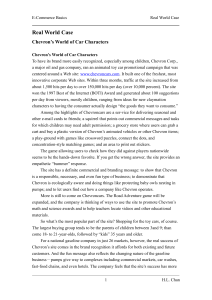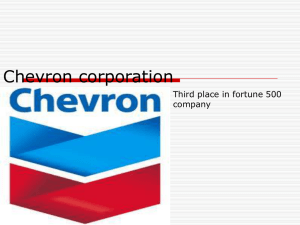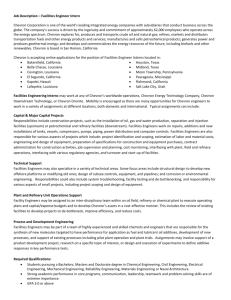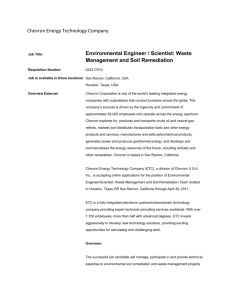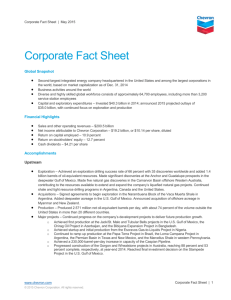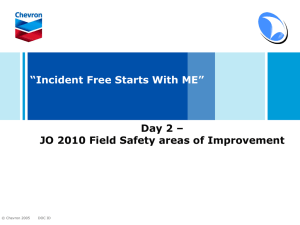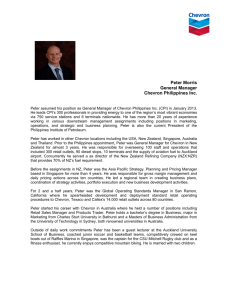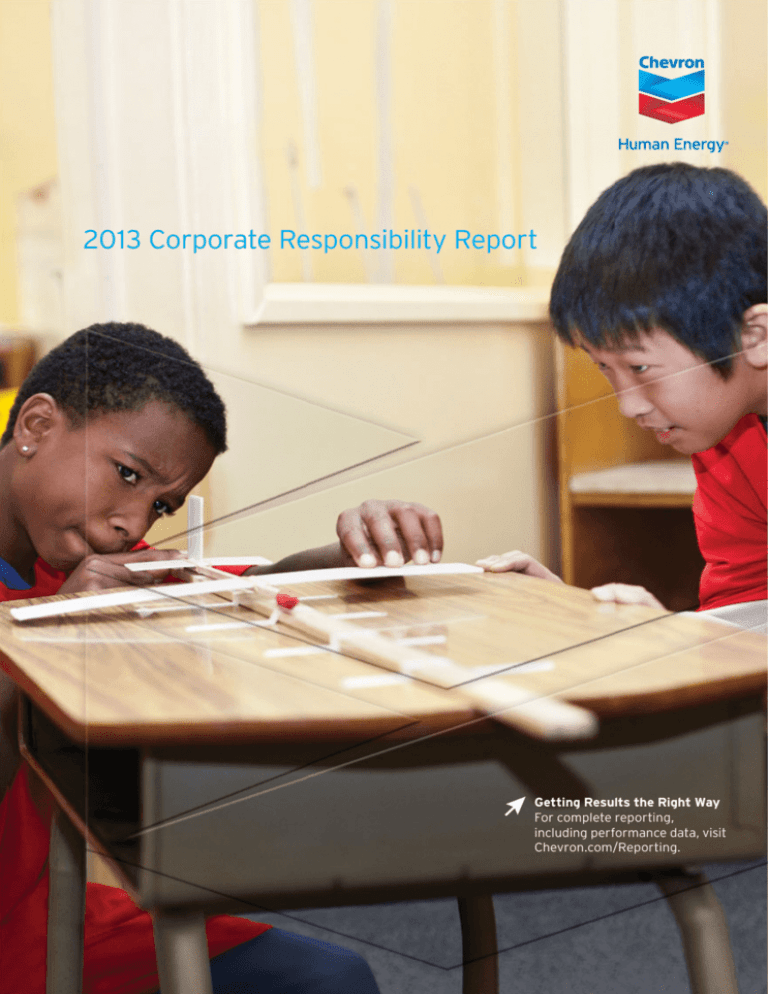
2013 Corporate Responsibility Report
Getting Results the Right Way
For complete reporting,
including performance data, visit
Chevron.com/Reporting.
Our New Approach to Reporting
Chevron’s previous Corporate Responsibility (CR)
report was produced annually as a comprehensive
printed document that also was shared online.
Our 2013 report marks a shift to a shorter printed
version of the report and expanded, more frequently
updated content on our website. Our CR performance data, which are now available online, are based
on IPIECA/API/OGP* sector-specific sustainability
reporting guidelines. Our move to greater online
reporting allows us to present the same data that
we have disclosed in previous years and to increase
disclosure on workforce health and safety, human
rights and other areas. The move is also being made
in response to the growing number of people seeking
information online. Our online CR content should
create better opportunities for information customization and feedback. We are continually seeking
ways to improve the delivery of CR reporting and
information; we will continue to make enhancements
as we incorporate feedback from diverse audiences
interested in our business activities.
Our environmental, safety and workforce performance
data and our 2013 reporting on IPIECA/API/OGP
indicators can be found at Chevron.com/Reporting.
On the cover: Students work together on a project at the Summer
Engineering Experience for Kids camp organized by the National
Society of Black Engineers. Supported by Chevron, the three-week
camp at Martin Luther King, Jr. Elementary School in Oakland,
California, inspired 242 students to take an interest in science,
technology, engineering and math.
* IPIECA (the global oil and gas industry association for environmental
and social issues)/American Petroleum Institute/International
Association of Oil & Gas Producers.
A MESSAGE FROM OUR CHAIRMAN AND CEO
John S. Watson
Chairman of the Board and Chief Executive Officer, May 2014
At Chevron, we are proud of the work that we do to safely develop
the energy that people and businesses around the world depend
on. Affordable, reliable energy is a cornerstone of economic growth
and helps improve the quality of life for communities throughout
the world. As we work toward our vision of being the global energy
company most admired for its people, partnership and performance,
we are guided by The Chevron Way, which defines who we are,
what we do and what we believe.
Everywhere Chevron operates, we strive to build lasting partnerships
that contribute to local economies. We have learned through
decades of experience that Chevron’s business success is deeply
linked to society’s progress and built upon long-term, collaborative
and mutually beneficial relationships.
Chevron.com/CR
1
The foundation of these relationships is our commitment to
The Chevron Way and the accompanying set of values that distinguish us and guide our actions. This report demonstrates the
impact and importance of two of those values — Partnership and
Protecting People and the Environment.
We demonstrate Partnership through a commitment to local
businesses, governments, communities and key stakeholders,
identifying needs and investing in solutions and programs that will
deliver measurable and lasting results. Over the past six years,
we’ve spent more than $258 billion in goods and services to supply
energy around the world. Our business and social investments
help advance local economies by supporting local businesses,
generating jobs and improving lives.
Beyond contributions to our partner countries through direct
business investment and taxes, we’ve made nearly $1.5 billion in
social investments in local communities over the past eight years
that foster economic growth, with a significant focus on health,
education and economic development programs and partnerships.
This includes spending almost $275 million on global social investments in 2013. Additionally, we support social progress through
our comprehensive Human Rights Policy and our promotion of
revenue transparency in the extractive industries.
We understand deeply that Chevron’s continued success depends
on our ability to operate responsibly. To deliver world-class safety
and environmental performance, we are guided by a commitment to
Protecting People and the Environment. Our Operational Excellence
Management System, built upon this value, provides employees with
the processes and tools needed to complete every task the right
way, every time.
In 2013, we continued to be a leader in personal safety, as measured
by injuries requiring time away from work. We also undertook
extensive actions to enhance process safety to prevent serious
incidents, and through these efforts we delivered our lowest
number of serious process safety–related loss-of-containment
2
Chevron.com/CR
events. However, we are not yet incident-free. Chevron is committed
to achieving our goal of zero incidents and will continue to focus
on achieving world-class performance in all measures of safety
and environmental stewardship.
We hope you find the information in this report to be informative
and useful. This report shares our progress throughout 2013
and highlights how we demonstrate our values and create prosperity in the communities where we operate — now and for generations
to come. You can learn more about our corporate responsibility
efforts online at Chevron.com/CR.
At Chevron, we are proud to invest in the people, projects and
communities that make our business possible.
The
Chevron
Way
The Chevron Way explains who we are, what we do, what we believe and what we
plan to accomplish. At the heart of The Chevron Way is our vision … to be the
global energy company most admired for its people, partnership and performance.
We make this vision a reality by consistently putting our values into practice.
The Chevron Way values distinguish us and guide our actions so that we get results
the right way. Our values are integrity, trust, diversity, ingenuity, partnership,
protecting people and the environment, and high performance.
To read more about The Chevron Way, visit
Chevron.com/ChevronWay.
For complete reporting, including performance
data, visit Chevron.com/Reporting.
Chevron.com/CR
3
PROTECTING PEOPLE AND THE ENVIRONMENT
Managing
Operational Risk.
Ingrained in The Chevron Way is our commitment to protecting
people and the environment, which includes developing
energy safely and reliably. We strive to develop a culture in
which everyone believes that all incidents are preventable
and that “zero incidents” is achievable. Our priorities every
day are to get our employees and contractors home safe
and to protect the environment.
2013 Global Employee Survey:
Favorability Percentage
97%
COMPANY IS ENVIRONMENTALLY RESPONSIBLE
88%
86%
Chevron 2013 Global
Employee Survey
73%
Global high-performing
companies’ norm in 2013
Oil, gas and chemical
companies’ norm in 2013
93%
COMPANY IS CONCERNED FOR HEALTH AND WELL-BEING
76%
95%
COMPANY SUPPORTS THE USE OF STOP-WORK AUTHORITY
83%
84%
Towers Watson benchmark data
4
Chevron.com/CR
Our Operational Excellence Management System
(OEMS) is a comprehensive, proven means of
systematic management of process safety, personal
safety and health, the environment, reliability, and
efficiency. Through disciplined application of
OEMS, we identify risks and integrate operational
excellence (OE) processes, standards, procedures
and behaviors into our daily operations. Our OEMS
is aligned with ISO 14001 and OHSAS 18001,* as
well as the Center for Chemical Process Safety’s
Guidelines for Risk Based Process Safety.
Within OEMS, we use a management system process
to drive continual improvement toward world-class
performance. This process is linked to business
planning and begins with defining a vision of success
and setting objectives. Gaps between current performance and these objectives are uncovered during
assessment. We develop plans to close the gaps,
implement the plans and review plan performance.
We set high expectations for ourselves, which requires
active leadership. We adopt and share best practices
with our business and industry partners, and we
continually take action to improve our practices and
meet our commitments. From 2005 through 2013,
our Days Away From Work Rate for our employees
and contractor workforce fell from 0.12 to 0.02.
Engaged and Capable Workforce
To advance our OE culture, we build on the belief
that all incidents are preventable, and we actively
communicate with and engage our employees and
contractors regarding our OE-related policies and
objectives. Every year, we run Global OE Focus campaigns to drive companywide awareness about OE
priorities and stimulate discussion and engagement
at the team level. Every three years, we conduct a
survey to measure employee engagement, retention
and wellness. In 2013, we received responses from
77 percent of our survey population. Ninety-eight
percent of employees who responded said that they
understand and apply Chevron’s OE standards in
their daily work activities. These results significantly
5
OE
Objectives
Above: Operators in the Gulf of Thailand walk the catwalk at the
Platong central processing platform.
surpass the global oil, gas and chemical company
benchmarks and global high-performing company
benchmarks, as measured by Towers Watson.
To enhance our workforce’s OE capabilities, we
develop our employees’ and contractors’ skills and
experience in several ways. For example, since 2003,
employees have attended OE Forums to take training and share information and best practices related
to our health, safety and environmental performance. Every business unit is required to conduct
regular performance and partnership engagements
with key contractors to review OE performance
and share best practices. We also hold forums
globally with our contractor workforce to promote
OE culture.
* International Organization for Standardization environmental management
system standard and Occupational Health and Safety Assessment Series
management system specification.
Operational excellence is
defined as “the systematic
management of process
safety, personal safety and
health, the environment,
reliability, and efficiency to
achieve top performance.”
It is based on five objectives.
To learn about our Operational Excellence Management
System, visit Chevron.com/OEMS.
Read about workforce development at Chevron.com/IPIECA.
1 Achieve an incident- and injury-free workplace.
2 Promote a healthy workforce and mitigate
significant workplace health risks.
3 Identify and mitigate environmental and
process safety risks.
4 Operate with industry-leading asset integrity
and reliability.
5 Efficiently use natural resources and assets.
Chevron.com/CR
5
PROTECTING PEOPLE AND THE ENVIRONMENT
Protecting People.
Chevron is committed to protecting the safety
and health of its more than 61,000 employees and
more than 200,000 full-time-equivalent contractor
workforce. We manage risk by applying policies, processes
and technologies to maintain our focus on having zero
incidents. Our attention to personal safety and process
safety goes hand in hand with our programs to promote
a healthy and engaged workforce.
TOTAL RATE:
INCIDENTS PER 200,000 WORK HOURS
0.20
Days Away
From Work
0.15
Competitor
Range:
BP, XOM & RDS*
0.10
0.05
Chevron rating relative
to independent oil company
competitors, “1” being
the lowest rate
2
2009
1
1
2010
2011
1
2012
2013
*Source: The data are publicly available from each company’s annual sustainability reporting: British Petroleum plc (BP), ExxonMobil Corp. (XOM) and
Royal Dutch Shell plc (RDS). XOM rates are lost-time incident rates. RDS rates are lost-time incident rates for injuries only. Competitor data for 2013
were not available at the time of publication.
6
Chevron.com/CR
In a survey of our
employees,
95%
said that they would
be supported for using
stop-work authority.
Below: Woraman Chalermwat, left, specialist for health,
the environment and safety, and Parinya Ploypray, medic,
discuss safety procedures at Chevron’s Platong oil and
gas production platform in the Gulf of Thailand.
Personal Safety
Personal safety is managed by many targeted
processes within our Operational Excellence
Management System (OEMS). Written safe-work
practices are a core part of our comprehensive
safety program. These safe-work practices help
ensure that potentially hazardous work, such
as electrical work or entry into a confined space,
is properly approved, assessed and performed
to achieve the safety standards necessary to prevent workplace injuries and incidents. We also take
steps to extend these safety principles to our contractors by reinforcing our expectations and monitoring compliance with requirements throughout
the life cycle of our projects. This includes engaging
with our contractors to improve oversight of their
activities, particularly when we lack operational
control. Motor vehicle safety also is written into
our OEMS. We prohibit the use of cell phones and
other electronic devices while employees are driving
company vehicles or driving on company business,
and we offer customized defensive-driver training
to employees and contractors through the Smith
System Driver Improvement Institute, Inc.
Chevron.com/CR
7
In a 2013 survey,
98%
of Chevron employees
said they apply Chevron’s
operational excellence
standards in their daily
work activities.
Our behavior-based safety programs, which
include peer evaluations, improve safety awareness
among all employees and contractors. Employees
and contractors alike know they have stop-work
authority and the responsibility to stop unsafe and
at-risk behaviors without repercussions.
While we have achieved industry-leading performance in preventing injuries, we are still experiencing
safety incidents that lead to fatalities, which is
not acceptable to us. Fatalities have a profound
impact on families, communities and our company.
Each incident and fatality is thoroughly investigated
so that we can understand the root causes and
learn from them. We then share lessons learned
throughout the company and apply them in
our daily practices. Chevron has also intensified
management focus on assuring that critical safeguards are in place for every high-risk activity.
We are also working together with other companies
in our industry to improve work processes that will
prevent these serious incidents.
Process Safety
We also apply OEMS to manage process safety and
work to prevent serious incidents, such as explosions, fires and accidental releases. We conduct systematic reviews of facilities and projects to reduce
risk, and we conduct hazard analyses to prevent
injury and loss of containment. Multiple layers
of protection are designed to prevent or contain a
small mistake or failure.
We saw a reduction in Tier 1 loss-of-primarycontainment incidents* from 74 in 2012 to 36 in
2013. Programs that contributed to this improvement involved well safety, asset integrity management, engineering and operations decision making,
safety performance tracking, the building of process
safety competency at all levels, and an increase in
our use of process safety leading indicators.
Above: Ashley Geneve, left, Gorgon Upstream offshore
construction manager, and Rory Denniss, Gorgon Upstream
advisor for health, safety and the environment, conduct a
safety inspection before the installation of the Gorgon project’s
subsea structure offshore Western Australia.
*The American Petroleum Institute defines a Tier 1 loss-of-primary-containment
incident as an unplanned or uncontrolled release of any material from
primary containment, including nontoxic and nonflammable materials, that
results in significant consequence.
8
Chevron.com/CR
Despite our success in reducing loss-of-containment
events, serious incidents in 2013 remind us that
we must continue to work toward zero process
safety incidents. Through what we learn, we improve
our procedures, training, maintenance programs
and designs to avoid repeating incidents. We share
lessons learned throughout the company and
with industry organizations, such as the American
Petroleum Institute.
Above: Susan Allen, head operator at Chevron’s Pascagoula, Mississippi, refinery, verifies that a pressure-relief device is properly tagged,
dated and set correctly at the Pascagoula base oil plant, where she is on assignment as an operations representative.
Product Stewardship
Product stewardship is another layer in our OEMS
to protect people and develop energy in ways that
respect the environment throughout a product’s
life cycle — from manufacturing to use and recycling
or disposal. We comply with regulations and act
in accordance with industry and international
standards wherever we operate. We assess safety,
health and environmental aspects of our products
and comply with product safety laws, both where
our products are made and in their intended
markets. In Europe, for example, the Registration,
Evaluation, Authorisation and Restriction of
Chemicals (REACH) regulatory framework requires
information about product environmental and
health impacts. We have registered more than
100 substances to date under REACH. We also
implement the United Nations’ Global Product
Strategy, a voluntary program that provides public
information on the safe use of chemicals.
Workforce Health
Chevron’s safety culture is paired with active efforts
to help employees live healthier lives. In some
of the areas where we operate, infectious diseases
such as HIV/AIDS and chronic maladies such as
cardiovascular disease can be prevalent. Our
workplace HIV/AIDS policy and training program
combine educational programs, peer-to-peer
training and counseling, and access to communitybased care and treatment to keep healthy workers
disease-free and to educate HIV-positive workers
on living with the illness. To date, nearly 17,500
current employees have completed HIV/AIDS awareness training.
Through our Healthy Heart program, we try
to reduce cardiovascular disease by offering an
annual voluntary risk assessment and educational
resources to employees and their adult dependents.
The program was updated in 2013 to increase
employee engagement in the United States and
Canada. From 2012 through December 2013, more
than 11,500 participants registered with the program.
For more information on Chevron’s workplace health and
safety programs, visit Chevron.com/HealthSafety.
Chevron.com/CR
9
PROTECTING PEOPLE AND THE ENVIRONMENT
Environmental
Stewardship.
For more than 135 years, we have been committed to
producing energy responsibly while continually striving
to improve our environmental performance and reduce
the potential for impacts from our operations. We have four
Environmental Principles that define our commitment
to operating in an environmentally responsible manner:
We include the environment in decision making, reduce
our environmental footprint, operate responsibly and
steward our sites.
Petroleum
Spill Volume:
Decreasing
Over Time
2013
2012
Chevron.com/CR
10,164
6,063
2009
10
1,684
779
2011
2010
Volume in barrels of spills to land and water that are
greater than or equal to one barrel are included.
2,135 TOTAL SPILL VOLUME
1,378 TOTAL VOLUME RECOVERED
9,584
7,952
8,054
6,250
Above: American alligators are native denizens of the Lower Neches Wildlife Management Area near Port Arthur, Texas, where Chevron
Environmental Management Co. created more than 110 acres of wetland habitat.
We incorporate these principles
into our business by applying the
Environmental Stewardship
Corporate-Standard Operational
Excellence process to our operations. This process is designed
to identify and manage potentially
significant environmental impacts
and assess our activities, with
the aim of improving performance.
In 2013, Chevron spent approximately $2.7 billion
on environmental management activities at its
consolidated companies, based on guidelines established by the American Petroleum Institute. These
expenditures included approximately $1 billion in
environmental capital expenditures and $1.7 billion
in costs associated with the prevention, control,
abatement or elimination of pollutants from operating sites, closed or divested sites, and abandoned
and restored sites.
7
Environmental
Aspects
Environmental, Social and Health
Impact Assessment
We apply our Environmental, Social and Health
Impact Assessment (ESHIA) process to all capital
projects within the company’s operational control.
The ESHIA process provides a systematic and
risk-based approach to identifying, assessing and
managing potentially significant impacts. The
assessments can include potential impacts of our
activities on surrounding communities, natural
resources, air quality, land and water, or community
health and livelihoods. Obtaining input from
communities and partners is central to the ESHIA
process and occurs throughout a project’s life
cycle. Our application of the ESHIA process is wide
ranging: It informs facility siting, infrastructure and
technology selection. The ESHIA process has also
helped our project development teams strengthen
the protection of local ecosystems, improve protection of endangered species and enhance our
community investments. Since 2007, we have used
our ESHIA process in the planning and implementation of nearly 900 capital projects worldwide.
For Chevron, getting results the right way
happens throughout the life of a project — from
planning and construction through operation
and decommissioning. To achieve this, we
use our Operational Excellence Management
System to manage potential risks from
the activities that may affect the environment. We have defined seven corporate core
environmental aspects to manage how our
businesses interact with the environment.
1 Accidental Releases Management
2 Air Emissions Management
3 Energy Efficiency and Greenhouse
Gas Management
4 Natural Resources Management
5 Site Residual Impact Management
6 Waste Management
7 Wastewater Management
Chevron.com/CR
11
Above: Chevron’s former refinery in Cincinnati, Ohio, is now a
certified monarch butterfly way station.
Biodiversity
Chevron’s Biodiversity Statement expresses the company’s commitment to incorporating biodiversity
considerations into its capital projects and operations. Our Operational Excellence Management
System includes internal processes and tools,
such as our ESHIA process, for managing potential
environmental impacts of all kinds, including
impacts on biodiversity. Our operations personnel
inventory their interactions with the environment,
including those that may affect biodiversity, and
develop plans for managing them. Through the
ESHIA process, we conduct a baseline assessment
of existing environmental conditions, such as the
presence of sensitive habitats or fishing grounds,
to inform our understanding of potential impacts.
The assessment results are incorporated into
project planning to help us avoid potentially
significant impacts and protect sensitive habitats.
Remediation and Restoration
Since 1998, Chevron Environmental Management
Co. (EMC) has served as Chevron’s leader in
site remediation and asset retirement and is a key
enabler to achieving Chevron’s environmental
stewardship goals. EMC works to decommission,
remediate and reclaim operating and legacy
sites, with the aim of beneficial reuse, including
habitat restoration and creation. For example, a
former Chevron refinery in Cincinnati, Ohio, is now
a certified monarch butterfly way station, which
provides resources necessary for the butterflies to
produce successive generations and sustain their
migration. In 2013, EMC was directly involved
in approximately one-third of Chevron’s estimated
worldwide environmental spending.
12
Chevron.com/CR
Freshwater Management
Chevron recognizes that water, and particularly
fresh water, is a critical resource for business, our
communities and the environment. In 2010, we
launched a corporate initiative to improve our
freshwater risk management and reporting practices, which included publishing our commitment to
responsible management of freshwater resources.
The initiative focuses on improving our corporate,
regional and local water risk identification and
management through the use of water mapping
tools. Also in 2010, we established a corporate water
metric, which collects data on fresh water. These
data show that we have continually improved our
measurement accuracy and data quality control.
In 2013, Chevron expanded its freshwater initiative
to incorporate non-fresh sources and beneficial
reuse of wastewater streams. This initiative continues to focus on water risk assessment and management through the life cycle of our assets.
Our global practices in natural gas from shale
operations recognize the importance of managing
water use and protecting water resources. In the
northeastern United States, we are working to
recycle 100 percent of our produced water. By doing
so, we are able to offset nearly 50 percent of our
freshwater use. We also recognize that the best
way to protect water resources is to use strong well
design and completion standards. Our wells have
multiple layers of steel casing and cement, forming
a barrier between hydrocarbons and groundwater.
Climate Change
We share the public and government concern
about climate change. The use of fossil fuels to
meet the world’s energy needs contributes to
an increase in greenhouse gas (GHG) emissions —
mainly carbon dioxide and methane — in Earth’s
atmosphere. Operationally, we continue to address
GHGs in our operations and explore innovative,
low-carbon energy technologies that will help us
manage our carbon emissions. This includes
continually improving the energy efficiency of
our operations. Additionally, we operate one of the
world’s largest geothermal energy portfolios and
have significant investments in two of the world’s
largest CO2 storage projects. We invest in advanced
biofuels research and in ways to reduce our equity
GHG emissions from flaring and venting. These
actions span all phases of technology development,
At our Sumatra, Indonesia, operations, where we have
94 oil-producing fields, an effort to curb flaring and
venting resulted in a 75% reduction of GHG emissions
and a 97% reduction in volatile organic compound
emissions since 2008.
Our score of
97 Points
on the Carbon Disclosure
Project’s S&P 500 Climate
Disclosure Leadership
Index was nine points
higher than the previous
year’s score.
Above: A pied oystercatcher flies above Barrow Island, a
Class A nature reserve offshore Western Australia. For 50 years,
Chevron has operated successfully on Barrow, the site of the
Gorgon natural gas project. During this time, all native species
have been carefully protected, with no invasive plants or animals
established on the island.
from research to demonstration and deployment,
and they significantly inform Chevron’s view and
involvement in GHG abatement.
In addition to taking inventory of our emissions,
we include GHG emissions management in how
we plan and execute our business. We consider
carbon costs when forecasting long-range supply,
demand and energy prices, and we thoroughly
assess a range of potential future policy and
economic growth outcomes. These analyses affect
our investment decisions and capital project
approvals worldwide.
Energy Consumption and Performance
Chevron continues to find new ways to use energy
more efficiently in its own operations. From 1992
to 2012, we used our Chevron Energy Index (CEI) to
track energy use performance across all operations
and measured a 34 percent improvement during
that time. CEI measured our operational energy
intensity based on estimated technological and
operational improvements and operational performance. Over time, as our assets have grown in size,
complexity and diversity, we recognized that energy
efficiency could be better measured and, ultimately,
improved. In 2013, we adopted new metrics to track
energy performance. The five metrics are Upstream
Energy Intensity, Manufacturing Energy Index,
Pipeline Energy Intensity, Shipping Energy Intensity,
and one for all other parts of the business. The new
metrics provide more relevant and transparent
energy performance measures for each segment
of our business. They are easier to understand, and
the segment-specific nature of these new metrics
will help drive energy performance improvements.
Read more about these environmental topics at
Chevron.com/Environment.
To learn more about our natural gas from shale
operations, please visit Chevron.com/Shale.
Chevron.com/CR
13
PARTNERSHIP
Building
Local Capacity.
We demonstrate our commitment to the
countries and communities where we operate
by creating jobs, employing local workforces,
and developing and sourcing from local
suppliers. This business strategy establishes
Chevron as a partner of choice that helps build
local economies and improve livelihoods.
In 2013, we
spent nearly
$59 Billion
on goods and
services globally.
14
Chevron.com/CR
Left: Driver Kumar Dyushimov
operates a crane at Adem Ecology,
a qualified Chevron supplier
in Kazakhstan.
92%
of our employees
worked in their home
countries in 2013.
We are committed to having a workforce that reflects
the communities where we operate. We onboard
and train the local people we hire, developing their
skills and capabilities, and we have many programs
in place to build capacity within the broader
local communities.
Supplier Sourcing
We apply a customized methodology to develop
national and local content for our major capital
projects and our ongoing operations. This process
is grounded in lasting partnerships. We collaborate
with national and local governments, national oil
companies, nongovernmental organizations, and
development agencies to identify high-impact,
sustainable supplier and workforce development
opportunities. We do this within our own supply
chain and our contractors’ supply chains. For
example, in Indonesia, where we have operated
for 90 years and are the country’s largest oil
producer, a local business development program that
we launched in 2001 has resulted in more than
6,100 contracts awarded to local Indonesian companies and approximately 41,000 jobs being created.
Capacity Building
After local companies are identified, we design and
implement programs to help them meet industry
standards and provide goods and services to Chevron
and other oil and gas producers. Metrics are agreed
upon with our partners and suppliers to make sure
that desired outcomes — in terms of quality, timeliness
and cost — are achieved. In Kazakhstan, where we
are a 50 percent partner in the Tengizchevroil LLP
(TCO) joint venture and the country’s largest private
oil producer, there are very few companies offering
household waste collection and disposal services.
TCO identified Adem Ecology for its local development program and helped the company secure
a loan for its new program that involves separating
recyclable materials from solid household waste.
Adem Ecology has since reduced the amount of
waste entering landfills by 30 percent. The local
company has qualified as a Chevron supplier.
We strive to remove barriers to economic growth,
so we invest in promoting equality and economic
empowerment for women. In 2013, we spent more
than $1 billion with women- and minority-owned
businesses in the United States and more than
$2.7 billion on goods and services from U.S.-based
small businesses.
To learn more about how Chevron benefits communities,
please visit Chevron.com/CR.
Chevron.com/CR
15
PARTNERSHIP
Social Performance.
Social performance is defined as the systematic
management of social impacts and stakeholder relationships.
Our social performance relies on conducting business
in an ethical and responsible way and engaging
openly with our workforce, partners and communities.
We work with communities and partners to focus our
support on strategic social investments in health, education
and economic development. We build trusted relationships
by focusing on engaging our stakeholders and managing
our potential social impacts through our Environmental,
Social and Health Impact Assessment process, Human Rights
Policy, and processes for stakeholder engagement and
legislative and regulatory advocacy. Additionally, we support
revenue transparency in the extractive industries.
16
Chevron.com/CR
WE HAVE
INVESTED
NEARLY
$1.5 Billion
in social programs and partnerships in health, education and
economic development over the past eight years.
HEALTH
Left: Chevron and Pact’s SHINE program has reached more than 1 million people across 1,166 Myanmar villages to bring
sustainable health solutions and improved livelihood opportunities. More than 600,000 people have directly benefited from access to health
services. Right: In partnership with the government of Angola and Texas Children’s Hospital, Chevron’s sickle cell initiative has, since 2011,
screened more than 65,000 babies and enrolled more than 900 in a disease treatment program.
ECONOMIC DEVELOPMENT
Left: By helping women overcome adversity and develop trade and business skills,
the Chevron-funded Vístete de Sueños (Dressed With Dreams) program in Venezuela benefits an estimated 2,100 people annually. Right: Since
2010, the Niger Delta Partnership Initiative has directly benefited more than 10,000 people and created more than 600 jobs.
EDUCATION
Left: Chevron has committed more than $1 million to support science, technology, engineering and math (STEM)
education programs and job training initiatives in its Marcellus operating areas of Pennsylvania, Ohio and West Virginia. Right: In 2013, Chevron
invested nearly $94 million in education worldwide and expanded support of U.S. STEM partnerships and programs, such as the Bay Area
Science Festival in San Francisco, by an additional $30 million over three years.
Chevron.com/CR
17
Social Investment
Our social investments aim to foster economic
stability and improve the quality of life in the
communities where we work. We cultivate strong
partnerships and make strategic investments
in health, education and economic development.
We work with communities first to understand
their needs and then to develop solutions together
that seek to remove barriers to economic growth.
In 2013, we spent $275 million globally.
HEALTH Chevron promotes healthy communities
by improving access to health care in order to
help eradicate disease. We partner with employees
and their families, community programs and global
health organizations, spending $40 million in
2013 on programs for treatment and prevention.
Since 2008, we have partnered with the Global
Fund to Fight AIDS, Tuberculosis and Malaria
to fight these diseases in areas where we operate,
directing $60 million for programs in Africa and
the Pacific Rim.
EDUCATION We believe education is a building
block for economic development and employability.
We support educational programs from kindergarten through college, and career and technical
training for the local workforce. In 2013, we invested
nearly $94 million in education worldwide, which
includes major funding for programs that promote
science, technology, engineering and math (STEM).
We expanded our long-term support for STEM
education in the United States by committing an
additional $30 million over three years in programs
and partnerships, which include Project Lead The
Way, the Fab Foundation, the National Academy of
Engineering, Achieve, the USA Science & Engineering Festival, the U.S. News STEM Solutions National
Leadership Conference, and DonorsChoose.org.
Our commitment to advancing STEM will help
prepare students to become future scientists,
engineers and innovators.
Marcellus
Partnership
Initiative
18
Chevron.com/CR
ECONOMIC DEVELOPMENT We boost local economies and increase incomes by creating jobs and
by building local workforce skills and capacity
through our supply chain activities. We invested
nearly $44 million in 2013 in local community-level
economic development initiatives. In 2010, we
launched the Niger Delta Partnership Initiative and
announced a five-year, $50 million endowment to
increase income, employment and equitable
economic growth in Nigeria. To date, through our
continued support and a total of 51 programs
implemented throughout the Niger Delta, more
than 5,000 people have been trained, including
400 local business owners and employees.
This resulted in more than 600 jobs being created.
Chevron achieved
a rating of
100%
on the Human Rights Campaign
Corporate Equality Index for the
ninth consecutive year.
Human Rights
Chevron has an unwavering respect for human
rights. We believe that although governments have
the primary duty to protect and ensure fulfillment
of human rights, we can play a positive role. We
adopted our Human Rights Policy in 2009 to foster
greater awareness of human rights issues throughout the company and enhance our capabilities to
identify and manage human rights issues in four
areas relevant to our business: employees, security
Chevron invested more than $1 million in 2013 to support
STEM programs and job training initiatives in its Marcellus
operating areas of Pennsylvania, Ohio and West Virginia.
We support programs such as the Carnegie Science Center,
Project Lead The Way and Mentors Community Wealth
Building Initiative.
Since 2003, Chevron has sponsored
HIV/AIDS education, awareness and prevention
organizations in Angola, including those
at Maria Imaculada HIV Voluntary Counseling
and Testing Center, in Cabinda Province,
where mothers receive milk supplements to
support infant health.
Since 2008, Chevron has directed $60 million to the
Global Fund for programs in Africa and the Pacific Rim.
According to Global Fund metrics, to date Chevron has
played a part in saving 8.7 million lives through its
support of the fund.
providers, communities and suppliers. Our policy is
consistent with the United Nations’ Guiding Principles on Business and Human Rights, endorsed by
the U.N. Human Rights Council in 2011.
We have a long-term commitment to strengthening
human rights protections. As a founding participant in the Voluntary Principles on Security and
Human Rights, we promote the principles as
good practice for managing security operations.
We also helped develop an IPIECA Responsible
Security Operations task force that is working to
further engage the industry on security and human
rights through information sharing and training.
In 2013, we participated in the task force’s first
peer-learning workshop.
Our Human Rights Policy guides our commitment to
respecting indigenous communities and the rights
of property owners, and we set expectations for how
our suppliers treat their employees. We work with
indigenous communities to understand their concerns throughout new project planning and during
ongoing operations. In addition, we try to avoid
relocation/resettlement whenever possible. When it
is unavoidable, we strive to work collaboratively and
transparently with communities that are affected.
We also require our key suppliers to adhere to
all domestic laws and encourage them to follow
the International Labour Organization’s core
principles of freedom of association, the right to
collective bargaining, the elimination of forced
Chevron.com/CR
19
Chevron
Humankind
Giving
In 2013, through our company-sponsored community involvement
program Chevron Humankind, 13,000-plus employees and
retirees contributed approximately 160,000 volunteer hours
to more than 5,600 charitable organizations in the United States.
Additionally, Chevron employees and retirees contributed more
than $19 million to U.S. nonprofits, which Chevron matched, for a
total of more than $37 million.
and compulsory labor, the abolition of child labor,
and the elimination of discrimination in the
workplace. We use regular meetings with our key
suppliers to reinforce our Human Rights Policy.
Revenue Transparency
Resource-rich countries have the ability to generate
revenues to spur economic development and
reduce poverty. We believe that the transparent
and accurate accounting of these revenues by
governments and extractive industry companies
contributes to stable, long-term investment climates,
economic growth and social well-being. To promote
revenue transparency globally, we participate in
the multinational, multistakeholder-run Extractive
Industries Transparency Initiative (EITI).
Chevron is the longest continually serving member
of the EITI Board. More than 40 countries are
now undertaking EITI’s external validation process
to ensure that they are implementing the program
according to agreed-upon standards. According
to the EITI International Secretariat, approximately
$1.2 trillion in government revenues has been
disclosed to date. Chevron currently operates or
has a nonoperated working interest in 17 EITIimplementing countries: Azerbaijan, Cameroon,
Chad, Democratic Republic of Congo, Ghana, Indonesia, Iraq, Kazakhstan, Liberia, Nigeria, Norway,
the Philippines, Republic of Congo, Sierra Leone,
Trinidad and Tobago, Ukraine, and the United States.
In addition, we are supporting several countries
in their efforts to join EITI, including Myanmar and
the United Kingdom.
NEARLY
7,400
Women Tested
In 2013, through our partnership
with Pact and the PROMOT project in
Bayelsa State, Nigeria, 148 health
workers have been trained to support
programs that prevent and treat
mother-to-child transmission of HIV.
Nearly 7,400 women have been tested
for HIV during prenatal care, and
nearly 700 received HIV counseling.
Learn more about Chevron’s social performance
at Chevron.com/CR.
Above: Pregnant women wait to be tested at Agudama
Comprehensive Health Center, Bayelsa State, Nigeria.
20
Chevron.com/CR
LRQA Assurance Statement
Relating to Chevron Corporation’s Corporate Responsibility Report for the calendar year 2013
This Assurance Statement has been prepared for Chevron U.S.A. Inc.
in accordance with our contract but is intended for the readers of
this report.
Terms of Engagement
Lloyd’s Register Quality Assurance Ltd. (LRQA) was commissioned by
Chevron U.S.A. Inc. on behalf of Chevron Corporation (Chevron) to
provide independent assurance on its processes used in the creation
of the Corporate Responsibility Report (CRR) for the calendar year
2013 to a reasonable level using LRQA’s verification approach.
Our assurance engagement covered Chevron’s operations and activities worldwide and specifically covered the following requirements:
• Reviewing the effectiveness of the processes for reporting health,
environmental and safety (HES) IPIECA performance indicators.
• Confirming consistency with the IPIECA/API/OGP Oil and Gas
Industry Guidance on Voluntary Sustainability Reporting (2010)
industry guidelines.
Our assurance engagement did not include verifying the accuracy
of data and information reported in the CRR.
LRQA’s responsibility is only to Chevron. LRQA disclaims any
liability or responsibility to others as explained in the end footnote.
Chevron’s management was responsible for preparing the CRR
and for maintaining effective internal controls over the reporting
processes and the CRR. LRQA’s responsibility was to carry out an
assurance engagement on the reporting processes in accordance
with our contract with Chevron. Ultimately, the CRR has been
approved by, and remains the responsibility of, Chevron.
LRQA’s Opinion
Based on LRQA’s approach, we believe that Chevron’s reporting processes were effective in delivering HES indicators that are useful for
assessing corporate performance and reporting information consistent
with common reporting elements in the IPIECA/API/OGP Oil and Gas
Industry Guidance on Voluntary Sustainability Reporting (2010).
The opinion expressed is formed on the basis of a reasonable level
of assurance and at the materiality of the professional judgment
of the verifier.
LRQA’s Approach
LRQA’s assurance engagement was carried out in accordance with our
verification procedure;* the following tasks, though, were undertaken as
part of the evidence gathering process for this assurance engagement:
Observations
Further observations and findings, made during the assurance engagement, are:
• Processes were in place to ensure that sites contributing to HES metrics
understood corporate reporting procedures and requirements.
• Methods used for calculating each HES performance metric were clearly
defined and communicated.
• Chevron’s reporting requirements for HES metrics were understood
and carried out. Data collected at the site and at local and business-unit
levels were checked and aggregated into corporationwide metrics.
• Responsibility for annually reviewing and updating reporting guidelines
was clear, with improvement in methodology regularly undertaken.
Areas for improvement were provided in a separate report to Chevron
management. These recommendations do not affect our opinion.
LRQA’s Competence and Independence
LRQA ensures the selection of appropriately qualified individuals based
on their qualifications, training and experience. The outcome of all
verification and certification assessments is then internally reviewed
by senior management to ensure that the approach applied is rigorous
and transparent.
LRQA is Chevron’s certification body for ISO 9001, TS 16949 and
Emission Trading Schemes (ISO 14064). The certification assessments
and verification are the only work undertaken by LRQA for Chevron
and as such do not compromise our independence or impartiality.
Andrea M. Bockrath
LRQA Lead Verifier
On behalf of Lloyd’s Register Quality Assurance, Inc.
April 9, 2014
LRQA Reference: UQA4000679
• Visiting Chevron Corporation in San Ramon, California, to review data
collection and checking processes.
• Visiting Chevron Upstream and Gas offices in Houston, Texas, and
Chevron Downstream and Chemicals headquarters in San Ramon,
California, to assess business-unit understanding and implementation
of Chevron’s HES reporting requirements.
• Visiting two Chevron Upstream and Gas operations in Thailand and
Colombia, one Chevron Downstream operation in the United States, and
the Chevron Technology Center in the United States to assess local understanding and implementation of Chevron’s HES reporting requirements.
• Interviewing key personnel to identify and gain an understanding of
Chevron’s reporting requirements, including key persons responsible for
drafting the CRR.
• Reviewing Chevron’s documented reporting requirements to validate
consistency of scope, definition and reporting requirements for each of
the HES performance indicators.
• Reviewing Chevron’s primary data collection tools to assess use in the
reporting processes.
• Evaluating consistency with the IPIECA/API/OGP Oil and Gas Industry
Guidance on Voluntary Sustainability Reporting (2010).
* LRQA’s verification procedure is based on current best practice and uses
the principles of AA1000AS (2008) — Inclusivity, Materiality, Responsiveness
and Reliability of performance data and processes defined in ISAE 3000.
Lloyd’s Register Group Limited, its affiliates and subsidiaries, including Lloyd’s
Register Quality Assurance Limited (LRQA), and their respective officers, employees
or agents are, individually and collectively, referred to in this clause as “Lloyd’s
Register.” Lloyd’s Register assumes no responsibility and shall not be liable to any
person for any loss, damage or expense caused by reliance on the information or
advice in this document or howsoever provided, unless that person has signed
a contract with the relevant Lloyd’s Register entity for the provision of this
information or advice, and in that case, any responsibility or liability is exclusively
on the terms and conditions set out in that contract.
The English version of this Assurance Statement is the only valid version. Lloyd’s
Register Group Limited assumes no responsibility for versions translated into other
languages.
This Assurance Statement is only valid when published with the Report to which it
refers. It may only be reproduced in its entirety.
Copyright © Lloyd’s Register Quality Assurance Limited, 2014. A member of the
Lloyd’s Register Group.
Chevron.com/CR
21
Our environmental, safety and workforce
performance data and our 2013 reporting on
IPIECA/API/OGP indicators can be found at
Chevron.com/Reporting.
About This Report
This report covers 2013 data and activities. We also occasionally mention activities that took place before
2013 and in early 2014 when they help provide a clearer picture of our performance. This report covers
our owned or operated businesses and does not address the performance of our suppliers, contractors
or partners unless otherwise noted. All financial information is presented in U.S. dollars unless otherwise
noted. Our previous report was published in May 2013 and covers 2012 data and activities.
We continue to be informed by reporting frameworks and guidelines that include the Oil and Gas Industry
Guidance on Voluntary Sustainability Reporting, 2nd edition, published in 2010 by IPIECA (the global oil
and gas industry association for environmental and social issues), the American Petroleum Institute (API),
and the International Association of Oil & Gas Producers (OGP). An index to help readers find information
corresponding to IPIECA/API/OGP indicators can be found at Chevron.com/IPIECA.
This report, previous editions of our report and additional information can be found at Chevron.com/CR.
We welcome your comments and feedback.
Ms. Patricia Allison and Ms. Marcy McCullaugh
Chevron Corporation
6101 Bollinger Canyon Road, Room 3208
San Ramon, CA 94583-2324
Cautionary Statement Relevant to Forward-Looking Information
WRITER
Peter Bartelme
This Corporate Responsibility Report by Chevron Corporation contains forward-looking
statements relating to the manner in which Chevron intends to conduct certain of
its activities, based on management’s current plans and expectations. These statements
are not promises or guarantees of future conduct or policy and are subject to a variety
of uncertainties and other factors, many of which are beyond our control.
Therefore, the actual conduct of our activities, including the development, implementation
or continuation of any program, policy or initiative discussed to forecast in this report,
may differ materially in the future. The statements of intention in this report speak only
as of the date of this report. Chevron undertakes no obligation to publicly update any
statements in this report. As used in this report, the term “Chevron” and such terms as
“the company,” “the corporation,” “their,” “our,” “its,” “we,” and “us” may refer to one
or more of Chevron’s consolidated subsidiaries or affiliates or to all of them taken as
a whole. All these terms are used for convenience only and are not intended as a precise
description of any of the separate entities, each of which manages its own affairs.
22
Chevron.com/CR
COMMUNICATIONS ADVISOR
Eileen Ostrow Feldman
PHOTOGRAPHY ADVISOR
Maura Warnecke
PHOTO CREDITS
Cover: Maura Warnecke
Page 3: Eric Myer
Pages 5 & 7: Marc Marriott
Page 12: Jim Myers
Page 17: Courtesy of Pact
(SHINE program)
Page 17: Marc Marriott
(Bay Area Science Festival)
Page 17: Courtesy of PIND
(Partnership Initiatives in the Niger Delta)
Page 20: Courtesy of Pact
(PROMOT program)
2013 Corporate Responsibility Report
Getting Results the Right Way
For complete reporting,
including performance data, visit
Chevron.com/Reporting.
2013 Annual Report
2013 Supplement to the Annual Report
2013 Corporate Responsibility Report
Learn More Online
The Annual Report, the Supplement to the
Annual Report and the Corporate Responsibility
Report are available on the Internet at
Chevron.com/Publications.
Scan this QR code with
your smartphone to access
Chevron’s 2013 Corporate
Responsibility Report and
performance information.
QR readers are available
from your phone’s app store.
Chevron.com/Reporting
This report is printed on Forest Stewardship
Council®–certified Mohawk Options 100, made
from 100 percent post-consumer waste. It is
processed elemental chlorine-free and produced
using wind energy.
Chevron Corporation
6001 Bollinger Canyon Road
San Ramon, CA 94583-2324 USA
www.chevron.com
Printed by Lithographix, Inc., whose rooftop solar
panels are expected to offset the company’s energy
demands by 30 percent.
Design: Sequel, New York
© 2014 Chevron Corporation. All rights reserved.
913-0386K 5/14 (15M)

